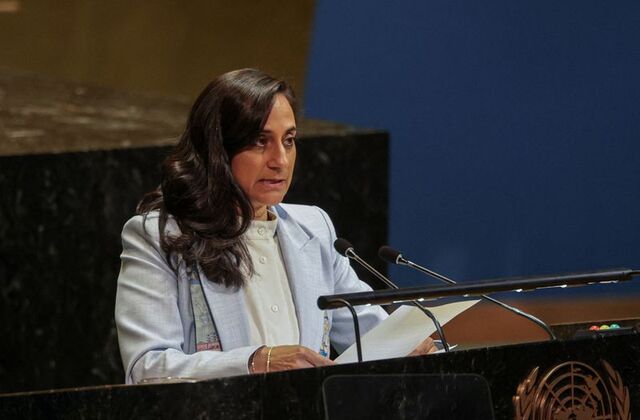Canada’s foreign policy has long been defined by its emphasis on diplomacy, international cooperation, and careful alignment with global allies. Yet, recent developments in the Middle East have thrust Ottawa into an uncomfortable spotlight. Following Israel’s strike on targets in Qatar that reportedly included Hamas leaders, Canada’s Foreign Minister announced that the government is now reconsidering its diplomatic and strategic relations with Israel.
- Canada’s Longstanding Ties with Israel
- The Catalyst: Israel’s Strike on Qatar
- Qatar’s Role in Regional Politics
- Canada’s Balancing Act Between Allies
- Expert Reactions and Global Implications
- Economic Considerations in Canada-Israel Relations
- The Domestic Debate in Canada
- Comparisons with Other Western Nations
- The Role of International Law and Sovereignty
- Potential Scenarios for Canada’s Next Steps
- Broader Implications for the Middle East
- FAQs
- Why is Canada reconsidering its relations with Israel?
- What role does Qatar play in Middle Eastern politics?
- How strong are Canada’s economic ties with Israel?
- Could Canada break ties with Israel completely?
- How does this affect Canada’s international reputation?
- Conclusion
This statement has sparked intense debate at home and abroad, raising questions about Canada’s position in the broader Middle East conflict, its relationship with the United States, and its responsibilities under international law. The move highlights how rapidly shifting dynamics in the Middle East can reverberate across continents, forcing nations like Canada to navigate the delicate balance between historical alliances and global expectations.
Canada’s Longstanding Ties with Israel
For decades, Canada has maintained a supportive relationship with Israel, rooted in shared democratic values and economic ties. Canada was among the first countries to recognize Israel in 1948 and has since backed its right to exist in peace and security. Over the years, successive Canadian governments—both Liberal and Conservative—have generally supported Israel in international forums, often aligning with Washington’s position.
However, this relationship has not been without controversy. Critics frequently argue that Canada’s unwavering stance has compromised its ability to act as a neutral mediator in the Israeli-Palestinian conflict. Canadian diplomats have historically voted against or abstained from United Nations resolutions critical of Israeli actions, drawing criticism from human rights organizations. Against this backdrop, the current reconsideration of relations signals a potentially historic shift in Canadian foreign policy.
The Catalyst: Israel’s Strike on Qatar
The immediate trigger for Ottawa’s reevaluation is the Israeli strike on Qatar, which Israeli officials claim targeted high-level Hamas operatives operating from Doha. Qatar, a nation often described as a mediator in the Middle East, has hosted Hamas leaders for years under the pretext of facilitating dialogue. The strike, however, pushed beyond the boundaries of Israel’s usual military operations and into the territory of a country considered an ally by many in the West.
Canada’s Foreign Minister condemned the attack as a violation of Qatari sovereignty and emphasized that Canada “cannot remain silent when actions risk destabilizing an already fragile region.” This position highlights Canada’s concern that Israel’s military actions are expanding beyond traditional conflict zones, with implications for regional stability and the rules-based international order.
Qatar’s Role in Regional Politics
To fully understand Canada’s response, it is crucial to consider Qatar’s position in Middle Eastern diplomacy. Though small in size, Qatar wields significant influence through its energy wealth, global media platforms such as Al Jazeera, and its role as an interlocutor between the West and groups like Hamas and the Taliban. The country has positioned itself as a key mediator, hosting negotiations that larger powers often cannot conduct directly.
For Canada, Qatar is not merely another state in the region—it is a partner in trade, energy, and international cooperation. Disregarding Qatari sovereignty through military strikes sends shockwaves across Western alliances, especially given Qatar’s strategic role in supplying natural gas to Europe and hosting U.S. military bases.
Canada’s Balancing Act Between Allies
Ottawa now finds itself at a crossroads. On one hand, Canada has historically aligned with Israel and the United States, forming a united front on Middle Eastern issues. On the other hand, the strike on Qatar complicates this alignment, as it challenges the principles of sovereignty and international law that Canada consistently upholds.
Foreign policy experts suggest Canada is weighing three critical factors:
- Domestic Politics: Canada’s population includes significant Jewish, Arab, and Muslim communities, all of whom closely monitor government decisions on the Middle East. Public opinion is divided, and the government faces pressure to balance these voices.
- Alliance with the U.S.: Canada’s most important foreign policy consideration is always its relationship with Washington. While the U.S. has continued to defend Israel’s actions, Canada risks friction if it distances itself too far from American policy.
- Commitment to International Law: Canada’s credibility on the global stage has long rested on its defense of international law and multilateralism. Criticizing Israel’s actions aligns with this tradition, but moving beyond rhetoric to alter relations would be a bold and unprecedented step.
Expert Reactions and Global Implications
International reactions to Canada’s statement have been swift. Middle East analysts argue that Ottawa’s position could embolden other Western nations to take a firmer stance on Israel’s military tactics. According to Dr. Nadia Hassan, a professor of international relations, “Canada has historically played a cautious role in the Middle East, but this marks one of the rare moments when Ottawa signals a willingness to distance itself from Washington’s default line.”
Human rights organizations have also welcomed Canada’s stance, noting that Western democracies often fail to hold Israel accountable for actions that violate international norms. Meanwhile, Israeli officials have expressed disappointment, warning that any downgrading of ties could damage economic and security cooperation.
Economic Considerations in Canada-Israel Relations
Beyond diplomacy, Canada and Israel maintain significant economic ties. Bilateral trade between the two countries reached nearly $2 billion in recent years, boosted by the Canada-Israel Free Trade Agreement (CIFTA). The two nations also collaborate in areas such as technology, cybersecurity, and defense.
If Ottawa were to reconsider or scale back relations, these economic partnerships could be jeopardized. Canadian companies operating in Israel and Israeli firms investing in Canada would face uncertainty. Analysts suggest that while a complete rupture is unlikely, targeted measures—such as freezing certain defense contracts—could be on the table if the government decides to act on its warning.
The Domestic Debate in Canada
Inside Canada, the announcement has sparked fierce debate. Opposition leaders are calling for parliamentary hearings on the issue, with some urging stronger condemnation and others warning against jeopardizing national security partnerships. Civil society groups have mobilized quickly, with Jewish organizations cautioning against measures that could alienate Israel and Arab and Muslim advocacy groups urging stronger accountability.
Canadian public opinion is also evolving. Recent polls indicate that while a majority of Canadians still support Israel’s right to security, an increasing number express concern over its military tactics and human rights record. For Prime Minister Justin Trudeau’s government, navigating these competing pressures is proving to be one of the most challenging foreign policy dilemmas of recent years.
Comparisons with Other Western Nations
Canada’s reconsideration is not happening in isolation. European countries, including France and Germany, have expressed concern over Israel’s strike in Qatar but stopped short of reconsidering relations. The United Kingdom has maintained a cautious approach, echoing U.S. support for Israel’s security while urging restraint.
If Canada proceeds with concrete policy changes, it could distinguish itself from its Western allies as one of the few to actively challenge Israel’s recent actions. This could bolster Canada’s reputation among nations in the Global South, which often criticize Western double standards in international conflicts.
The Role of International Law and Sovereignty
At the core of Canada’s position is the principle of sovereignty. The strike on Qatar violated international norms by targeting a third-party state not officially at war with Israel. Canada, as a member of the United Nations and a proponent of multilateral diplomacy, has consistently emphasized that military actions must comply with international law.
By voicing concern, Ottawa is not only defending Qatar but also reinforcing broader principles that safeguard smaller states from unilateral aggression. This approach resonates with Canada’s history of peacekeeping and advocacy for rules-based international order, positioning the country as a defender of norms rather than a passive bystander.
Potential Scenarios for Canada’s Next Steps
Canada’s reconsideration of relations could unfold in several ways:
- Diplomatic Review: Canada may choose to reassess its diplomatic protocols, limiting high-level visits and symbolic gestures without cutting ties entirely.
- Trade Adjustments: The government could suspend or renegotiate aspects of the trade agreement, particularly in sensitive sectors like defense.
- International Advocacy: Canada might use forums like the UN or G7 to push for greater scrutiny of Israel’s actions, signaling leadership in multilateral diplomacy.
- Full Realignment: Though less likely, Canada could pursue a more radical shift by aligning with European or non-aligned states in adopting a harder stance on Israel.
Each of these paths carries risks and rewards, and much will depend on Israel’s next moves, as well as Washington’s willingness to pressure Ottawa.
Broader Implications for the Middle East
Canada’s reconsideration may also have ripple effects in the Middle East. If Ottawa joins calls for accountability, it could strengthen Qatar’s diplomatic position and encourage greater unity among states opposed to unchecked Israeli military actions. Conversely, a hard break with Israel could push Ottawa out of sensitive negotiations, weakening its influence in the region.
The Middle East remains one of the most volatile regions in global politics, and even small shifts in alliances can trigger larger consequences. For Canada, the challenge is to remain engaged without being consumed by the region’s endless conflicts.
FAQs
Why is Canada reconsidering its relations with Israel?
Canada is reconsidering its relations with Israel following an Israeli strike on Qatar that targeted Hamas leaders. The Foreign Minister argued that this violated Qatari sovereignty and destabilized regional security, prompting Ottawa to review its diplomatic and economic ties with Israel.
What role does Qatar play in Middle Eastern politics?
Qatar serves as a mediator in regional conflicts, hosting Hamas leaders and facilitating negotiations between various parties. Its importance is amplified by its vast energy resources and close ties with Western nations, making any attack on its territory a matter of international concern.
How strong are Canada’s economic ties with Israel?
Canada and Israel share significant trade and investment relations, with bilateral trade valued at nearly $2 billion annually. They collaborate in technology, defense, and cybersecurity, meaning any deterioration in relations could carry economic consequences.
Could Canada break ties with Israel completely?
A complete break in relations is unlikely given Canada’s history of supporting Israel and its alignment with the United States. However, Ottawa could implement targeted measures such as suspending defense contracts or reducing high-level diplomatic engagement.
How does this affect Canada’s international reputation?
By criticizing Israel’s actions, Canada strengthens its reputation as a defender of international law and sovereignty. However, distancing itself too far from U.S. policy could strain its most critical alliance, leaving Canada to carefully balance its global role.
Conclusion
Canada’s reconsideration of its relationship with Israel after the strike on Qatar represents more than a fleeting diplomatic dispute—it signals a potential inflection point in Canadian foreign policy. For decades, Ottawa has walked a fine line between supporting Israel and advocating for international law, but this latest development may force a redefinition of that balance.
As the world watches, Canada’s decision will reverberate far beyond Ottawa and Tel Aviv. It will shape the nation’s credibility on the international stage, influence its alliances, and reflect its commitment to global principles of sovereignty and accountability. Whether Canada ultimately takes bold action or opts for cautious diplomacy, this moment underscores how even distant conflicts can reshape the foreign policy priorities of nations thousands of miles away.







